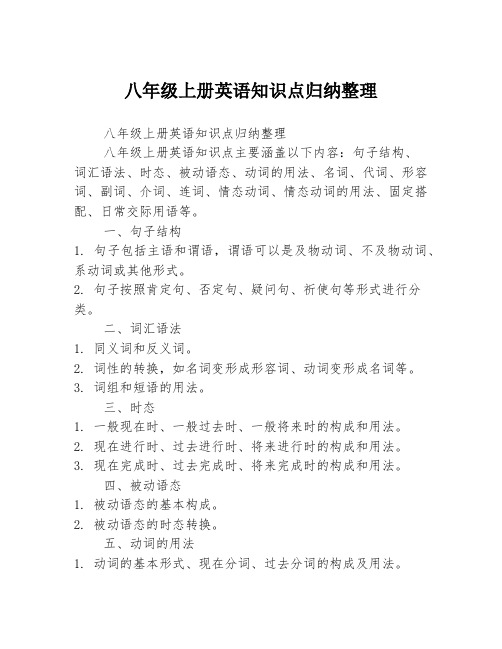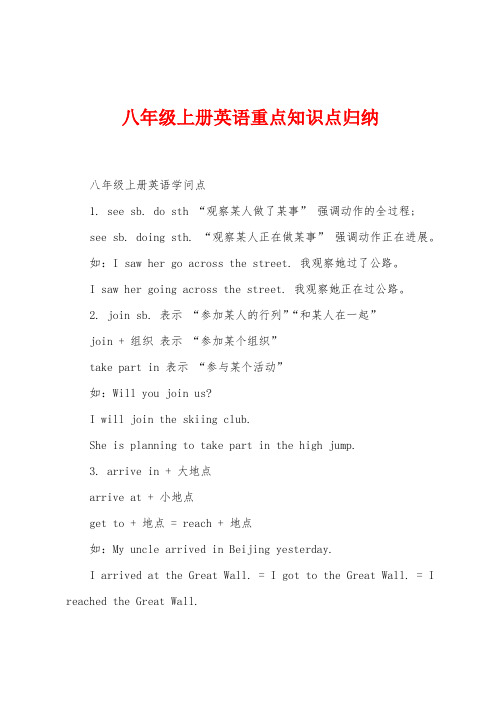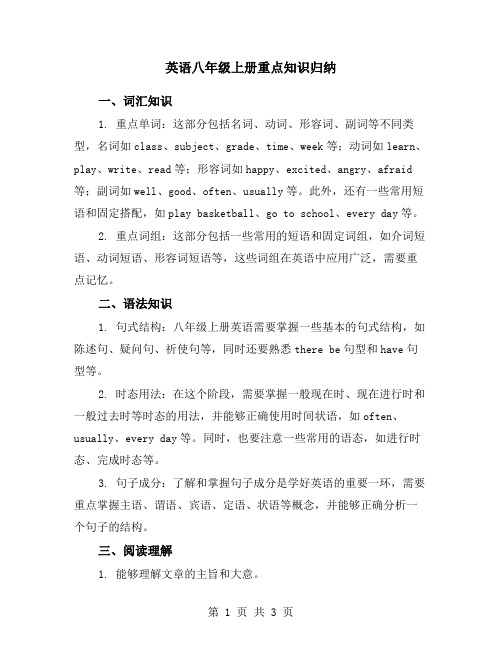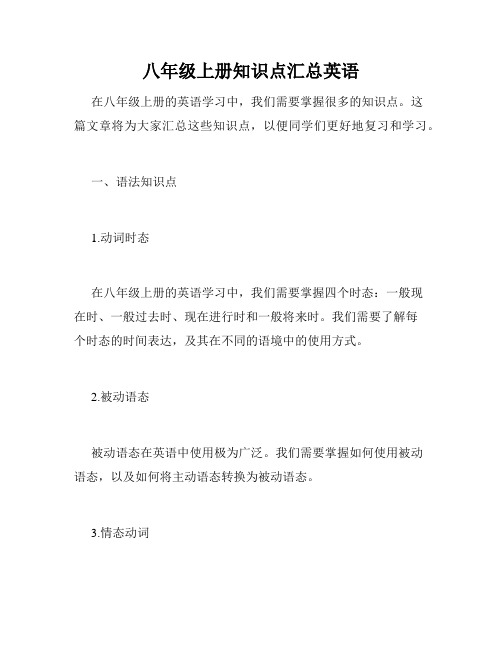初二上学期英语知识点总结归纳
八年级上册英语知识点归纳整理

八年级上册英语知识点归纳整理八年级上册英语知识点归纳整理八年级上册英语知识点主要涵盖以下内容:句子结构、词汇语法、时态、被动语态、动词的用法、名词、代词、形容词、副词、介词、连词、情态动词、情态动词的用法、固定搭配、日常交际用语等。
一、句子结构1. 句子包括主语和谓语,谓语可以是及物动词、不及物动词、系动词或其他形式。
2. 句子按照肯定句、否定句、疑问句、祈使句等形式进行分类。
二、词汇语法1. 同义词和反义词。
2. 词性的转换,如名词变形成形容词、动词变形成名词等。
3. 词组和短语的用法。
三、时态1. 一般现在时、一般过去时、一般将来时的构成和用法。
2. 现在进行时、过去进行时、将来进行时的构成和用法。
3. 现在完成时、过去完成时、将来完成时的构成和用法。
四、被动语态1. 被动语态的基本构成。
2. 被动语态的时态转换。
五、动词的用法1. 动词的基本形式、现在分词、过去分词的构成及用法。
2. 动词的逻辑主语和关系代词。
六、名词1. 单数名词和复数名词的区别,复数名词的构成规则。
2. 可数名词和不可数名词的区别。
七、代词1. 人称代词、物主代词、反身代词的用法。
2. 指示代词、不定代词的用法。
八、形容词1. 形容词的一般用法。
2. 最高级和比较级形容词的构成和用法。
九、副词1. 副词的一般用法。
2. 最高级和比较级副词的构成和用法。
十、介词1. 常见的介词及其用法。
十一、连词1. 常见的连词及其用法。
十二、情态动词1. can、could、may、might、shall、should、will、would、must、need等情态动词的用法。
十三、情态动词的用法1. 表示能力、可能性、许可、请求、建议、必须等。
2. 情态动词表将来时态的用法。
十四、固定搭配1. 常见的固定搭配及其用法。
十五、日常交际用语1. 日常交际中常用的问候语、道歉、表示感谢等用语。
以上为八年级上册英语知识点的归纳整理,涵盖了语法、词汇、句型、语用等多个方面的内容。
初二上册英语知识点总结归纳

初二上册英语知识点总结归纳英语在考试占据重要分值,不管是初中还是高中都是必考科目,所以学好英语是很有必要的。
下面是店铺分享给大家的初二上册英语知识点总结,希望大家喜欢!初二上册英语知识点总结一1.参加take part in/be in/ join in+活动参加活动 takepart in the long jumpjoin the school rowing club加入组织be/play for/against sth支持/反对某人 /某事效力They both play for the HoustonRockets in the NBA. 反义词play againt对阵2.花费人+spend some time/money onsth/in doing sth花费时间或者金钱在某事上/做某事人+pay some money for sth物+cost/ take help sb (to) dosomething=do sb. a favor=give sb a hand3.到达reach/ get to/arrive in/at+地点, in为大地点,inBeijing, at为小地点 at home4.著名be famous for Chinais famous for the Great Wall. 因。
而闻名be famous as Chongqingis famous as the Moutain City.称之为,美誉5.like动词喜欢feellike doing sth 喜欢做某事like介词像looklike看起来像 sound like听起来像 smell like闻起来像,taste like尝起来像.6.看look look up a word in adictionary查单词look like看起来像,look at看一看, look for寻找, look over检查, look after7.借I can lend you some tapes ofher songs. 主语借出We often borrow books from thelibrary.主语借进Can I borrow your bike?我能借你的自行车吗?=Can you lend me your bike?=Can you lend your bike to me? 你可以借你的车给我吗?8.照顾动词carefor the patients 照顾病人,名词take care of sb/oneself,形容词Becareful当心(反)careless9. 猜测Collecting stamps must begreat fun. 收集邮票想必很有趣。
八年级上册英语知识点归纳总结

八年级上册英语知识点归纳总结1.八年级上册英语知识点归纳总结篇一连接代词和连接副词引导的宾语从句。
1. 由连接代词 who, whom, whose, what, which 等引导,不能省略。
例如:Do you know who he is?2. 由连接副词 how, where, when, why 引导,也不可省略。
例如:I don't know where I can buy this kind of camera.3. 宾语从句用陈述句语序,即:连接词 + 主语 + 谓语 + 其他。
4. 主句与从句的时态关系:(1) 如果主句是一般现在时,从句可以是根据情况所需要的任何时态。
例如:I don't know when she came here.Can you tell me when he will come here?(2) 如果主句是过去的时态,从句也应用过去时态的某一种。
但若从句是表示客观事实或真理时,从句时态不受主句时态的限制,应用一般现在时。
例如:He told us why he would stay at home the next day.The teacher explained how the earth goes around the sun.5. 某些由连接代词或连接副词引导的宾语从句可改为含“特殊疑问词 + 动词不定式”结构的简单句。
例如:Can you tell me where I can buy this book?Can you tell me where to buy this book?2.八年级上册英语知识点归纳总结篇二单音节形容词和部分双音节词大多是以y、ly、er结尾的双音节形容词,一般在词尾加-er。
以不发音字母e结尾的词,在词尾直接加-r。
重读闭音节词词尾只有一个辅音字母,元音发短音时,双写尾字母,再加er。
以“辅音字母+y”结尾的双音节词,变“y”为“i”,再加-er。
八年级上册英语重点知识点归纳

八年级上册英语重点知识点归纳八年级上册英语学问点1. see sb. do sth “观察某人做了某事”强调动作的全过程; see sb. doing sth. “观察某人正在做某事”强调动作正在进展。
如:I saw her go across the street. 我观察她过了公路。
I saw her going across the street. 我观察她正在过公路。
2. join sb. 表示“参加某人的行列”“和某人在一起”join + 组织表示“参加某个组织”take part in 表示“参与某个活动”如:Will you join us?I will join the skiing club.She is planning to take part in the high jump.3. arrive in + 大地点arrive at + 小地点get to + 地点 = reach + 地点如:My uncle arrived in Beijing yesterday.I arrived at the Great Wall. = I got to the Great Wall. = I reached the Great Wall.留意:reach here/there/home = get here/there/home = arrive here/there/home4. leave…离开……leave for…动身去…/离开到…如:They are leaving Beijing tomorrow. 明天他们要离开北京。
They are leaving for Japan the day after tomorrow. 后天他们要前往日本。
5. a few“几个,一些”修饰可数名词a little“一点点”修饰不数名词如:There are a few eggs in the basket.There is a little water in the bottle.6. how long 表示“多久(时间)”; 提问时间段.how often 表示“多常; 多久一次”; 提问时间的频率.如: They will stay in Beijing for a week. → How long will they stay in Beijing?He plays basketball twice a week. → How often does he play basketball?7. be good at (doing) sth. = do well in (doing) sth. 擅长于(做)某事如:She is good at (playing) baseball. = She does well in (playing) baseball.8. make sth/sb + adj. 使某物(某人)在某种状态keep …sth/sb + adj. 保持某物(某人)在某种状态如:Playing soccer can make your body strong.Swimming can help to keep your heart and lungs healthy.八年级英语语法学问一般将来时1. be going to 构造①表示主语规划、准备做某事。
英语八年级上册重点知识归纳

英语八年级上册重点知识归纳一、词汇知识1. 重点单词:这部分包括名词、动词、形容词、副词等不同类型,名词如class、subject、grade、time、week等;动词如learn、play、write、read等;形容词如happy、excited、angry、afraid 等;副词如well、good、often、usually等。
此外,还有一些常用短语和固定搭配,如play basketball、go to school、every day等。
2. 重点词组:这部分包括一些常用的短语和固定词组,如介词短语、动词短语、形容词短语等,这些词组在英语中应用广泛,需要重点记忆。
二、语法知识1. 句式结构:八年级上册英语需要掌握一些基本的句式结构,如陈述句、疑问句、祈使句等,同时还要熟悉there be句型和have句型等。
2. 时态用法:在这个阶段,需要掌握一般现在时、现在进行时和一般过去时等时态的用法,并能够正确使用时间状语,如often、usually、every day等。
同时,也要注意一些常用的语态,如进行时态、完成时态等。
3. 句子成分:了解和掌握句子成分是学好英语的重要一环,需要重点掌握主语、谓语、宾语、定语、状语等概念,并能够正确分析一个句子的结构。
三、阅读理解1. 能够理解文章的主旨和大意。
2. 能够理解文章的细节和事实。
3. 能够根据上下文猜测生词的意思。
4. 能够理解作者的观点和态度。
5. 不断提高阅读速度和理解能力。
四、写作知识1. 写作技巧:掌握一些基本的写作技巧,如正确的语法、拼写和标点符号,以及正确的文章结构等。
2. 写作实践:通过不断的写作练习,提高自己的写作能力。
除此之外,八年级上册英语还需要注意以下几个方面:1. 听力训练:每天坚持进行听力训练,提高听力理解能力。
2. 口语表达:鼓励学生多进行口语练习,提高口语表达能力。
在口语表达中要注意语音、语调和语速等方面的问题,同时也要注意表达的准确性和得体性。
八年级上册知识点汇总英语

八年级上册知识点汇总英语在八年级上册的英语学习中,我们需要掌握很多的知识点。
这篇文章将为大家汇总这些知识点,以便同学们更好地复习和学习。
一、语法知识点1.动词时态在八年级上册的英语学习中,我们需要掌握四个时态:一般现在时、一般过去时、现在进行时和一般将来时。
我们需要了解每个时态的时间表达,及其在不同的语境中的使用方式。
2.被动语态被动语态在英语中使用极为广泛。
我们需要掌握如何使用被动语态,以及如何将主动语态转换为被动语态。
3.情态动词情态动词是一种特殊的动词形式,包括can、could、may、might、must、shall、should、will和would等。
我们需要了解每个情态动词的意义和用法。
4.虚拟语气虚拟语气用于表达可能的假设、愿望、虚拟的情况、建议等。
我们需要学会使用虚拟语气,并注意不同情况下的使用方式。
二、单词和词组知识点1.常用动词和形容词在八年级上册的英语学习中,我们需要掌握一些常用的动词和形容词。
例如:finish、like、enjoy、happy、sad、angry等。
这些单词经常出现在日常生活中,因此我们需要熟练掌握它们。
2.常用词组熟练掌握一些常用词组对于我们的英语学习是非常有帮助的。
例如:take care of、look forward to、work on、pay attention to等。
这些词组在我们的英语表达中使用频率较高,因此我们需要注意学习它们的用法。
3.其他单词和词组在八年级上册的英语学习中,我们还需要学习一些其他的单词和词组。
例如:transportation、entertainment、wildlife、historic sites、directions等。
这些单词和词组与生活中的各个方面相关,我们需要在学习它们的同时了解它们的实际意义和使用场合。
三、阅读理解知识点1.注意细节在进行阅读理解时,我们需要注意细节。
这包括阅读材料的文字表述、时间和地点等信息,以及与阅读内容相关的语言技能。
8年级上册英语全部知识点
8年级上册英语全部知识点一、Unit 1 Where did you go on vacation?1. 重点单词。
- anyone pron. 任何人,常用于否定句和疑问句中。
例如:Did you meet anyone interesting?- anywhere adv. 在任何地方,用于否定句和疑问句。
如:I can't find my pen anywhere.- wonderful adj. 精彩的;绝妙的。
可以用来形容经历、事物等,例如:We had a wonderful time on the beach.- few adj. & pron. 不多;很少,修饰可数名词复数,表示否定意义。
例如:Few students like this difficult subject.- quite a few相当多;不少,后接可数名词复数。
例如:There are quite a few books on the shelf.- most adj., adv. & pron. 最多;大多数。
例如:Most students in our class like English.- something pron. 某事;某物,常用于肯定句中。
例如:I have something important to tell you.- nothing pron. 没有什么;没有一件东西,例如:There is nothing in the box.- everyone pron. 每人;人人;所有人,例如:Everyone should follow the rules.- myself pron. 我自己;我本人,是反身代词。
例如:I can look after myself.- yourself pron. 你自己;您自己,例如:You should believe in yourself.2. 重点短语。
八年级上册英语重点知识点
八年级上册英语重点知识点英语重点学问点一、重点短语1. on time2. best wishes3. give a talk4. for example5. short for6. a waste of time7. go on a field trip8. go fishing9. I agree10. next week11. the day after tomorrow12. have a picnic13. have some problems doing sth.14. go the wrong way15. hurry up16. get together17. in the open air18. on Mid-Autumn Day19. come over20. have to21. get home22. agree with23. in the country24. in town25. all the same26. in front of27. on the left/right side28. next to29. up and down30. keep healthy31. grow up32. at the same time33. the day before yesterday35. last Saturday36. half an hour ago37. a moment ago38. just now39. by the way40. all the time41. at first二. 重要句型1. have fun doing sth.2. Why dont you?3. Were going to do sth.4. start with sth.5. Why not?6. Are you going to?7. be friendly to sb.8. Youd better do sth.9. ask sb. for sth.10. say goodbye to sb.11. Good luck(with sb)!三. 交际用语1.Welcome backto school!2.Excuse me. Im sorry Im late, because the traffic is bad.3.It doesnt matter.4.Happy Teachers Day !5.Thats a good idea.6.What are you going to do?7.Where are we going ?8.What are we going to do ?9.Im good at10.Its not far from11. Are you free tomorrow evening?12.Would you and Lily like to come over to my home for Mid-Autumn Festival?13.Im glad you can come.14.Thanks for asking us.15.How about another one?16.May I have a taste?17.Let me walk with you.18.What do you have to do?19.Do you live on a farm?20.Which do you like better, the city or the country?21.Which do you like best, dogs, cats or chickens?22.Shall we go at ten? Good idea!23.---Lets make it half past one. ---OK.24.---Why not come a little earlier? ---All right.25.Excuse me. Wheres the nearest post office, please?26.Its over there on the right.27.Im sorry I dont know.28.Youd better29.Thank you all the same.30.Which bus do I take?31.Go along this road.32.What day was it yesterday?33.Im sorry to hear that.34.I hope youre better now.35.Why did you call me?36.I called to tell四. 重要语法1.be going to的用法;2.形容词的比拟级、最高级;3.形容词和副词的比拟4.一般过去时五.重要学问点讲解1. on the street / in the street表示在街上时,on the street 和in the street 都可以,在美国多用on the street, 在英国多用in the street. 例如:We have a house in the street. 我们在街上有座房子。
八年级英语上册知识点归纳
八年级英语上册知识点归纳故有知识的人,道义上有为后者代言的义务。
人最容易丧失的是同情心,而杜甫就是一个正面例子。
下面小编给大家分享一些八年级英语上册知识点归纳,希望能够帮助大家,欢迎阅读!八年级英语上册知识点1I’m going to study computer science.【重点词语/短语用法解析】1.want to be/become + (职业)名词:“想要成为…..”I want to be (be) a scientistwhen I grow up.2.write stories 写故事tell stories 讲故事3.keep on doing sth. 继续做某事(表动作的反复)keeping doing sth. 保持做某事(表动作或状态的持续)4. besure about +名/代/V-ing“肯定”Are you sure about that?make sure (that)+从句“…...确保...…”Make sure that both doors are closed whenyou go out.5.learn sth. We must learn English every day.learn to do sth. I amgoing to learn to play ( play) the piano.6. discuss v. 讨论;商量名词是discussiondiscuss with sb. 与某人讨论 :Discuss this question with yourpartner.Let’sdiscuss this problem. 让我们讨论一下这个问题。
All we need now is action, not discussion. 我们现在需要的是行动,不是讨论。
7. beable to do sth. 能够做某事(1)can : can+动词原形,无人称和数的变化。
八年级上册英语必考知识点
八年级上册英语必考知识点八年级上册英语的学习是初中英语学习的关键阶段,涵盖了丰富的语法知识和词汇。
为了帮助同学们更好地备考,本文将梳理八年级上册英语中的一些必考知识点,帮助大家系统地复习和巩固所学内容。
一、重点词汇八年级上册英语涉及了大量新词汇,其中包括一些常用的动词、名词、形容词和副词等。
例如:动词:include, suggest, compare, prefer, provide等名词:environment, pollution, invention, education等形容词:important, necessary, convenient, useful等副词:always, usually, often, sometimes, never等二、基本语法本学期的语法学习主要集中在一般现在时、一般过去时、现在进行时和一般将来时四种时态上。
同时,也会接触到一些基本的复合句和状语从句。
时态:一般现在时:表示经常性或习惯性的动作,如:I usually goto school by bus.(我通常乘公交车去学校。
)一般过去时:表示过去某个时间发生的动作或存在的状态,如:I went to the zoo last weekend.(我上周末去了动物园。
)现在进行时:表示正在进行的动作或发生的情况,如:She is studying for the exam.(她正在为考试而学习。
)一般将来时:表示将来某个时间将要发生的动作或存在的状态,如:I will meet my friend at the park tomorrow.(我明天会在公园和朋友见面。
)复合句:主句和从句构成的句子,如:I think(主句) that he will come(从句).(我认为他会来。
)状语从句:用来修饰主句中的动词、形容词或副词等的从句,如:If it rains(条件状语从句), we will stay at home.(如果下雨,我们就会待在家里。
- 1、下载文档前请自行甄别文档内容的完整性,平台不提供额外的编辑、内容补充、找答案等附加服务。
- 2、"仅部分预览"的文档,不可在线预览部分如存在完整性等问题,可反馈申请退款(可完整预览的文档不适用该条件!)。
- 3、如文档侵犯您的权益,请联系客服反馈,我们会尽快为您处理(人工客服工作时间:9:00-18:30)。
初二上学期英语知识点总结归纳初二的时候学习英语怎么能没有学习方法呢?其实学习英语最好的学习方法是经常复习。
下面是分享给大家的初二上学期英语知识点,希望大家喜欢!初二上学期英语知识点一1.参加take part in/be in/ join in+活动参加活动takepart in the long jumpjoin the school rowing club加入组织be/play for/against sth支持/反对某人/某事效力They both play for the HoustonRockets in the NBA. 反义词play againt对阵2.花费人+spend some time/money onsth/in doing sth花费时间或者金钱在某事上/做某事人+pay some money for sth物+cost/ take help sb (to) dosomething=do sb. a favor=give sb a hand3.到达reach/ get to/arrive in/at+地点,in为大地点,inBeijing, at为小地点at home4.著名be famous for Chinais famous for the Great Wall. 因。
而闻名be famous as Chongqingis famous as the Moutain City.称之为,美誉5.like动词喜欢feellike doing sth 喜欢做某事like介词像looklike看起来像sound like听起来像smell like 闻起来像,taste like尝起来像.6.看look look up a word in adictionary查单词look like看起来像,look at看一看, look for寻找, look over 检查, look after7.借I can lend you some tapes ofher songs. 主语借出We often borrow books from thelibrary.主语借进Can I borrow your bike?我能借你的自行车吗?=Can you lend me your bike?=Can you lend your bike to me? 你可以借你的车给我吗?8.照顾动词carefor the patients 照顾病人,名词take care of sb/oneself,形容词Becareful当心(反)careless9. 猜测Collecting stamps must begreat fun. 收集邮票想必很有趣。
类似事实Collectingstamps is fun. 收集邮票很有趣.10.能够be able to+ 动词原形can+动词原形11. close形容词They are close friends亲密的朋友.动词Close the door.关门cover 名词盖子,动词覆盖12. enough have enoughfood/rice/money/books(名词)He is not tall(形容词)enoughto reach the fan.=He is too short to reach the fan(够得着风扇).cold/warm/big/small+enough足够冷/暖/大/小13.介词for 与to(有不定式就用for, 无则用to)Rainforests/Plants and animalsare important/usful/necessaryto us.Water is important to us.Water is very important for us to live.Water is necessary to us. It s necessary for us to learn English.be helpful in doing sth在某方面有帮助, behelpful to do sth抽象名词Some stamps are of greatvalue=Some stamps are very valuable.This meeting is of greatimportance=This meeting is very important.Computers are of greatuse=Computers are very useful.14. live 动词居住,第三人称单数liveslive 形容词,活的, live models 真人模特life 名词,生命,复数lives15. keep him active/healthy,keep the classroom clean, keep the thief waiting and standing outside,keeptrying16.help sb with sth在某方面帮助某人The Internet can help us to do a lot of things.help名词with the help of Jane=withJane s help 反义词without17. plan名词the plans for this year/nextweek动词How do you plan to celebrateit?=How are you going to celebrate it?18.exciting, excited,interesting, interested, tiring, tired(说人用ing, 形容物用ed)The movie was very exciting.People are excited.an exciting movieThe stories are veryinteresting. He is very interested in it.an interesting storyThe job is tiring. She is verytired of it. You have a tiring job.19.change my clothes换我的衣服, 名词a change in the old city walls,need a changelet me out/in(副词)让我出去/进来,letme sing/cry(动词)让我唱/哭20.代替instead of+n./pron.宾格/Ving代替,而不是instead 副词,可以单独使用位于句首和句末做状语take the place of +名词/代词初二上学期英语知识点二1、如有always ,often, usually, sometimes, seldom, never, once a....,every...用一般现在时,第一、二人称复数后跟动词原形,第三人称单数后跟动词加s / es 。
2、如有now ,look! ,listen, at the moment ....用现在进行时,结构是be (am, is, are) +v-ing3、如有tomorrow, the day after tomorrow, from now on, in +一段时间, some day, next....用一般将来时,结构:will + v原\ be going to +v原(没有动词用be )4、如有yesterday, ......ago , last....just now.....用一般过去时动词加edgive sb. Sth.=give sth. to sb. 给某人某物every day每天,write down 写下,记下write it (them) down everyday每天的,日常的,how about doing sth.=what about doing sth.做....怎么样each other 互相.thanks a lot= thank you very much非常谢谢回答That s all right. =You re welcome.= That OK.= It s my pleasure.=Not at all.Why don t you+V原...=why not+...V原为什么不help sb. with sth. 在某方面帮助别人help sb. (to )do sth.帮助某人做某事with one s help=with the help of sb.在某人的帮助help oneself to sth.请自用食物watch sb. do sth. 看到某人做了某事,(现在没有做,做过)watch sb. doing sth.看到某人正在做某事(正在做)see, hear 类似remember to do sth.想起记得要做某事,未做事remember doing sth.相起记得做过某事forget to do sth. 忘记要做某事forget doing sth.忘记做过某事welcome back欢迎回来, new term新学期this term这学期, next term 下学学期,last term上学期, give you some advice给你一些建议why not 为什么不, make a mistake=make mistakes犯错误correct spelling正确的拼写, what else?=what other things? 还有什么a piece of advice 一条建议, follow /take one s advice采用别人的建议,send sth to sb.=send sb. sth. 寄给某人send for派人去请/取send up发射. all the time一直enjoy oneself=have a good time=have a great time=have fun, 玩得愉快lots of =a lot of =many(可数)\much(不可数)许多, ,spend : sb. spend some time on sth.某人花费时间做某事sb. spend some time (in) doing sth. 某人花费时间做某事Sb. spend some money on sth. 某人花费钱买某物Sb. spend some money (in) buying sth.某人花费钱买某物Cost: sth. cost sb. some money 某物花去某人钱pay: sb. pay some money for sth. 某人支付钱T ake: It takes (took) sb.some time to do sth.做某事花去某人时间ask for 请求,要求, ask sb. for sth.向某人要某物ask sb. to do sth.要求某人做某事a piece of一块enjoy doing sth喜欢做某事.finish,practise, mind, miss ,consider,keep, continue,这些词语后跟动名词形式V-ing place sth.in =put sth. in 把某物放在里面else常修饰不定代词,关系代词或副词,也可修饰all, much,little等,else要位于其后。
